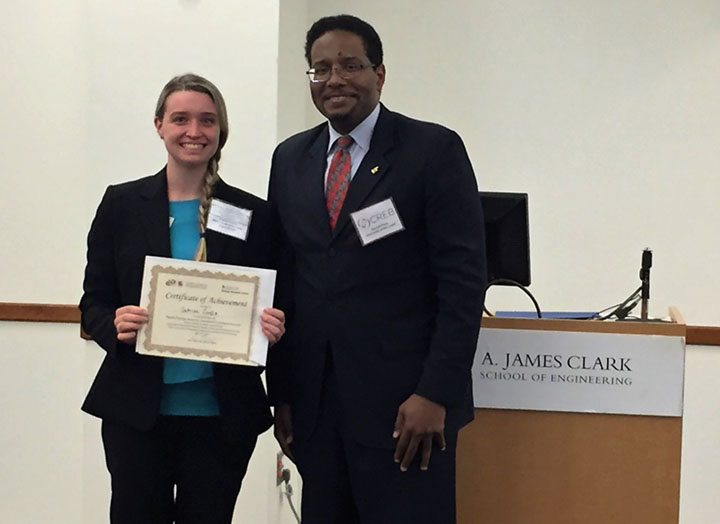NEES News
7th Annual Engineering Sustainability Day focuses on Energy Storage
The 7th annual University of Maryland Energy Research Center's (UMERC) Engineering Sustainability Day kicked off on Tuesday, April 25, 2017 as Darryll Pines, Dean of the UMD Clark School of Engineering, welcomed the audience of 100+ and reminded them that in this time of research funding uncertainty, it is imperative that as scientists, we promote and advocate for scientists and the science. Science, specifically energy research, translates directly into consumer products. Energy research and technology allow for a diverse funding and application portfolio including the aerospace and defense industries, as well as biological and medical applications. Eric Wachsman, UMERC Director, introduced the list of distinguished plenary speakers in the morning including Delegate Marc Korman of the Maryland legislature; Dr. Ellen Williams, UMD distinguished professor and former ARPA-E director; and Steven Chalk, acting assistant director of the DOE Office of Energy Efficiency and Renewable Energy. As this year’s workshop theme focused on energy storage, Delegate Korman reminded everyone that Maryland’s goal of 25% renewable energy by 2022 was within our reach and that energy storage is critical to the future. In 2016 Maryland doubled the amount of installed energy storage from the previous year. Delegate Korman also encouraged everyone to continue to connect the science to public policy and to reach out to their representatives in promoting scientific research. Meanwhile, Dr. Williams reminded the audience that we have twice as much energy capacity as we need and thus there is a real opportunity to store and provide energy to consumers at cheaper costs, but the power grid needs to be modernized. The grid system is currently inflexible and is in such dire need of modernization that “even Thomas Edison would still recognize the grid today”. DOE’s Chalk also noted that energy storage is an enabler for technology and that the last 15 years have seen tremendous growth in building towards a sustainable future. DOE has worked hard to diversify their energy portfolio over these past 15 years to include more solar, wind and geothermal energy storage. Chalk also noted that CO2 emissions are currently down 22% on the power grid. EERE continues to develop opportunities for energy storage applications and to create a centralized and distributed power grid system. In the afternoon, the Sustainability Workshop was held in conjunction with the Center for Research in Extreme Batteries (CREB) annual meeting. Several key talks on energy storage in both sessions focused on battery technology and consumer use. The overall goal promoted was to provide consumers with clean and economical energy while creating increased ability to store excess energy for future use. Furthermore, the shared theme of speaking up for the role of science, research, and its application remained pervasive throughout the day. And, as Professor Gary Rubloff noted, “We must insist on public policy based on scientific evidence”. A student poster contest was held at the workshop’s conclusion. First place awards were given in the categories of Fundamental Energy Research and Applied Energy Research. Dean Pines presented Emily Sahadeo, a graduate student in the Department of Chemistry, the award for Fundamental Energy Research for her poster entitled “Design and Electrochemical Testing of Nanoscale Electrode Materials for Magnesium Batteries”. Sabrina Curtis, an undergraduate engineering major, was awarded the Application Energy Research prize for her work on “Moving toward Manganese-based Electrolytes for Novel Redox Flow Battery Systems”.
April 28, 2017 Prev Next |












